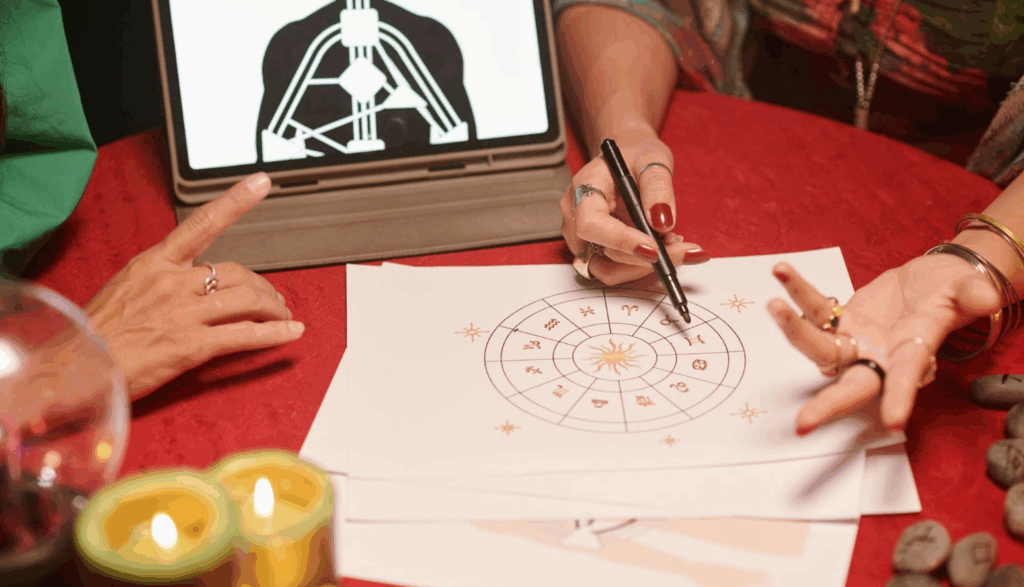At first glance, astrology and neuroscience occupy two very different territories—one steeped in symbolic interpretation and ancient tradition, the other grounded in measurable data and empirical observation. Yet, when we look closely, an intriguing bridge begins to form between the two: the idea that the rhythms of the cosmos and the rhythms of the human brain may not be so different after all.
Astrology is based on the principle that planetary movements influence or reflect patterns in human behavior, emotion, and even life events. These movements—such as the cycles of the Moon, the retrogrades of Mercury, or the conjunctions of outer planets—create repeating cosmic signatures. They’re believed to resonate with inner shifts in consciousness, offering a map to emotional or spiritual timing.
In neuroscience, the brain is constantly cycling through electrical rhythms known as brain waves—delta, theta, alpha, beta, and gamma. Each wave frequency is associated with specific mental and emotional states. Delta waves (0.5–4 Hz) dominate during deep sleep. Theta waves (4–8 Hz) appear during dreaming and deep meditation. Alpha waves (8–13 Hz) mark relaxed alertness, beta waves (13–30 Hz) appear during active thinking, and gamma waves (30+ Hz) are linked to peak cognition and consciousness.
The fascinating possibility arises when we consider how these brain states might correspond to astrological timings. For instance, lunar cycles have been linked in some studies to fluctuations in melatonin levels, sleep quality, and emotional sensitivity. Anecdotally and culturally, people often report feeling more energized or emotionally stirred during a full moon, a time associated in astrology with culmination, clarity, and heightened emotion—conditions that could align with increased brainwave activity in the higher-frequency bands like beta or even gamma.
Moreover, specific planetary archetypes may mirror neural states. Mars, the planet of action and drive, could be seen as corresponding to the high-frequency beta waves—alertness, decision-making, and outward focus. Neptune, often associated with dreams, altered states, and intuition, feels aligned with the slower theta waves that arise during deep meditation or trance. The Moon, governing emotion and instinct in astrology, may reflect the fluid shifts between alpha and theta states—those spaces where we access imagination, memory, and reflection.
Related: Astrology and Universal Laws: What Cosmic Principles Teach Us About Life

While science has yet to confirm any direct causal connection between planetary positions and brain activity, the concept of resonance remains compelling. Just as tides are influenced by lunar gravity, perhaps human consciousness is subtly tuned to the cosmic environment we inhabit. After all, humans evolved under the sky—our biological rhythms attuned to sunlight, darkness, seasonal change, and possibly even planetary motion.
What this emerging dialogue suggests is not a need to choose between astrology and neuroscience, but an opportunity to explore how the two might inform each other. Astrology can offer symbolic language and temporal frameworks for understanding inner states, while neuroscience provides tools for measuring and mapping those states in the brain.
In a time when interdisciplinary thinking is increasingly valued, the overlap between cosmic patterns and brain wave dynamics invites a deeper reflection: What if our inner worlds are not just personal but planetary? What if the stars and synapses are simply two expressions of a greater universal intelligence?
The search for meaning—whether through science or symbolism—may ultimately lead us to the same truth: that we are not isolated observers of the universe, but active participants in its unfolding rhythm. And perhaps, somewhere between a natal chart and an EEG reading, lies a hidden harmony waiting to be discovered.
Related: Water Signs and Intuition: How Cancer, Scorpio, and Pisces Sense the Unseen





















